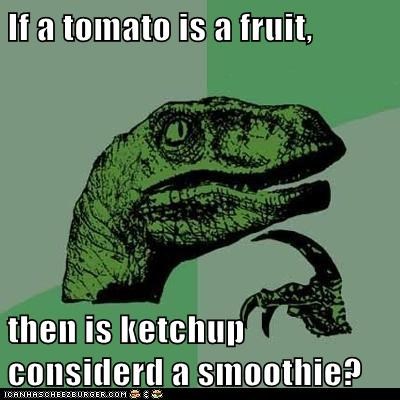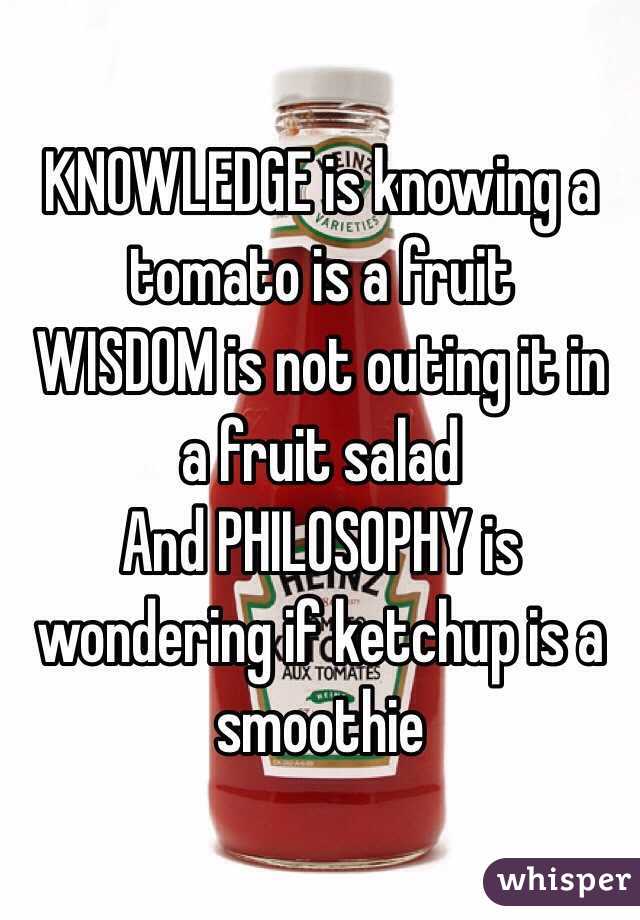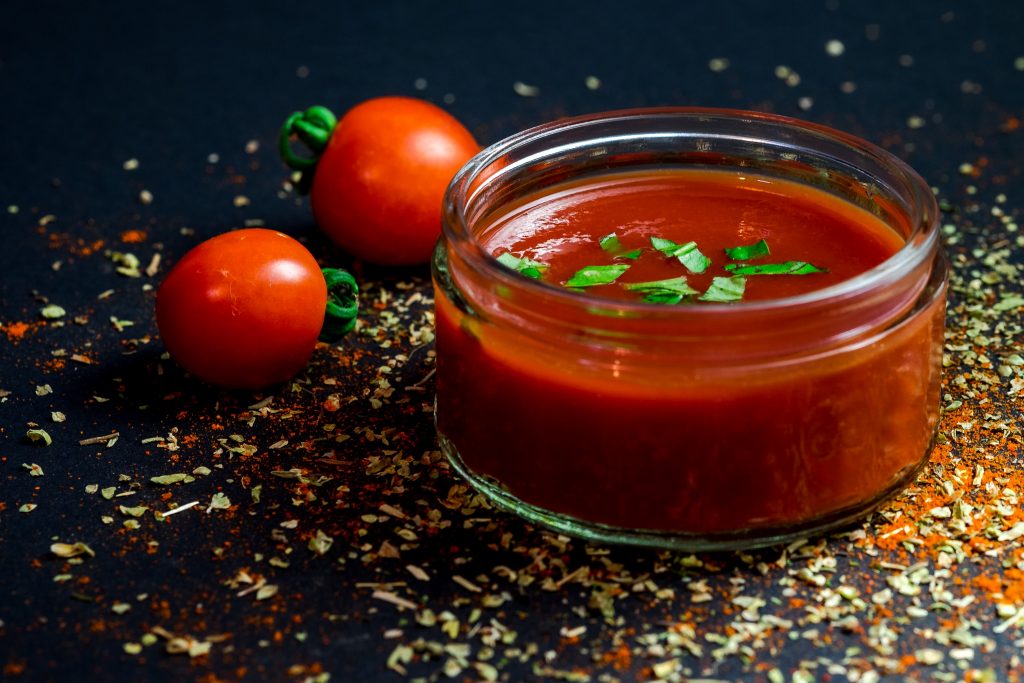The other day, I came across this funny meme:

I just laughed it off, but a few of my friends seriously considered this meme. After all, tomatoes are a fruit (apparently so many people search this that if you try Googling “is tomato a fruit,” Google will personally answer your question), ketchup is just a blend of tomatoes and other ingredients, and what are smoothies? A blend of fruits and other ingredients.
However, just because they have similar definitions does not mean you should start drinking ketchup through a straw. Because, no, ketchup is not a smoothie. And here’s why.
How Tomato Ketchup Is Made
While ketchup ingredients and its quantities may vary between different ketchup manufacturers, the most common ingredients are fairly similar: tomato paste, vinegar, sugar or any sweetener (in the video, it uses agave nectar), white vinegar, and other spices. Watch the video to see how Organicville tomato ketchup is made.
Why Tomato Ketchup Isn’t a Smoothie
If you’ve ever bought a smoothie or made one yourself, you have a fairly good idea of how it’s made. Smoothies are a mixture of ice, fruits, and your choice of milk, yogurt, seeds, and even vegetables. It’s not the same as a milkshake, which uses ice cream and syrups for a thicker consistency, though, but sometimes they do overlap. Now, take a look at the differences between a smoothie and ketchup.
Smoothies are cold, ketchup is cooked.
First, smoothies are made cold while ketchup is cooked. A few people may opt to reduce or completely leave out ice from their smoothie recipe to make it less cold, but ketchup is always cooked before being bottled up at room temperature. In the video, you’ll see that the ketchup ingredients are transferred and mixed inside a cooking kettle.
Ketchup lasts longer.
Second, smoothies are meant to be finished in one sitting. You’ll notice that people who like to drink smoothies hardly ever make it in large batches and leave it in the fridge to consume in parts for days. That’s because smoothies can go bad after 24 hours because they’re no longer fresh. It’s like when you bite into an apple and, less than an hour later, you begin to see the apple’s insides turn brown. It’s organic, so it starts to go bad.
Ketchup, on the other hand, has white vinegar which serves as a preservative, which gives it its long shelf life. Unopened, ketchup has a shelf life of two years. After opening, as long as you keep the cap on when not in use, your ketchup has a shelf life of one year if kept inside your fridge or around a month if you store it in a dry, cool place in your pantry.
Tomato ketchup has high amounts of vinegar and sugar.
In smoothies, you’d only add around one or two tablespoons of sugar, honey, or any sweetener onto your blend. You know what you’re unlikely to put? White vinegar and a few kilograms of sugar. A hundred grams of ketchup contains 22 grams of sugar. If an average Heinz Tomato Ketchup bottle has almost 400 grams of ketchup, then that means there is 88 grams of sugar (around seven tablespoons of sugar) in one bottle.
You wouldn’t seriously drink a bottle of ketchup through a straw, would you?
Smoothie sizes depend on the sizes you’re buying the smoothie from or the amount you’re making for yourself. Health buffs who drink smoothies for a fitter lifestyle strictly consume around 8 to 10 fluid ounces or around one cup. However, if you go to smoothie stores, you’ll find that some stores sell cups as big as 32 ounces. If you’ve ever been to a 7-Eleven, you may know what a Slurpee is (basically sodas frozen into smoothie consistency) and might have seen how big the sizes can reach.
On the other hand, even people who like adding ketchup to their food will not enjoy finishing a bottle with a straw. Aside from having a different consistency from smoothies, ketchup contains large amounts of salt and vinegar, which isn’t good for your body in large amounts. Sure, there are traces of lycopene from the tomato paste, but the effects of it are minimal considering the other ingredients it has.
Ketchup isn’t even originally made of tomatoes.
Ketchup wasn’t even made with tomatoes until the early 19th century, and even then people used a sour tomato blend until it became a generally sweet blend by the mid-1850’s. Prior to this, ketchup’s history traces back to a 17th century Chinese dish called kê-chiap, which translates to “brined picked fish.”
Yes, the original ketchup blend was made with pickled fish and spices.
By the 18th century, English settlers who got a taste of “kicap” from Malaysia created their own version with mushrooms and shallots. It wasn’t until 1742 when it was brought to the United States did people remove the fish sauce and it developed into the flavor we know today.
A smoothie, on the other hand is… well, a smoothie.
Tomatoes are basically still a vegetable.
The difficulty of humans classifying everything in nature into categories is that often you’ll find things that match the description of one category can also fit in another (check out this crazy thread talking about coconuts sharing similar characteristics as mammals). Tomatoes, for example, fit in the same category as both fruit and vegetable.
Botanically, a tomato is considered a fruit because the actual tomato is the ripened flower ovary of the tomato plant, is sweet and fleshy like many other fruits. However, vegetables are plants that aren’t high in fructose (just like a tomato) and are more often served as dishes or sides while fruits are served as snacks or desserts. Because of the flavor profile of a tomato, it doesn’t really fall under a fruit and is used in cooking as more of a vegetable. Still, that hasn’t stopped people from creating ketchup-flavored ice cream or ice cream rolls with Heinz tomato ketchup.
Verdict: Ketchup is NOT a Smoothie
There may be tomato juice and Bloody Mary cocktails that prove tomatoes can be made into a beverage, but that does not mean ketchup cannot be considered a smoothie. Just because tomato is a fruit does not mean that a blended tomato concoction like ketchup is automatically considered a smoothie.
Ketchups are cooked, have longer shelf life, and have a certain blend for it to taste like the tomato ketchup we all know and love. Smoothies, however, are generally cold, have a shelf life of about a day, and are more on the sweeter dessert or cold drink side than ketchup, which is used as a condiment for more savory meals.

To quote another famous internet saying: knowledge is knowing that tomatoes are fruits, but wisdom is knowing not to toss a tomato in a fruit salad. The saying recently extended, saying that philosophy is wondering if ketchup is a smoothie. And, well… there’s a reason some philosophies are debated.

